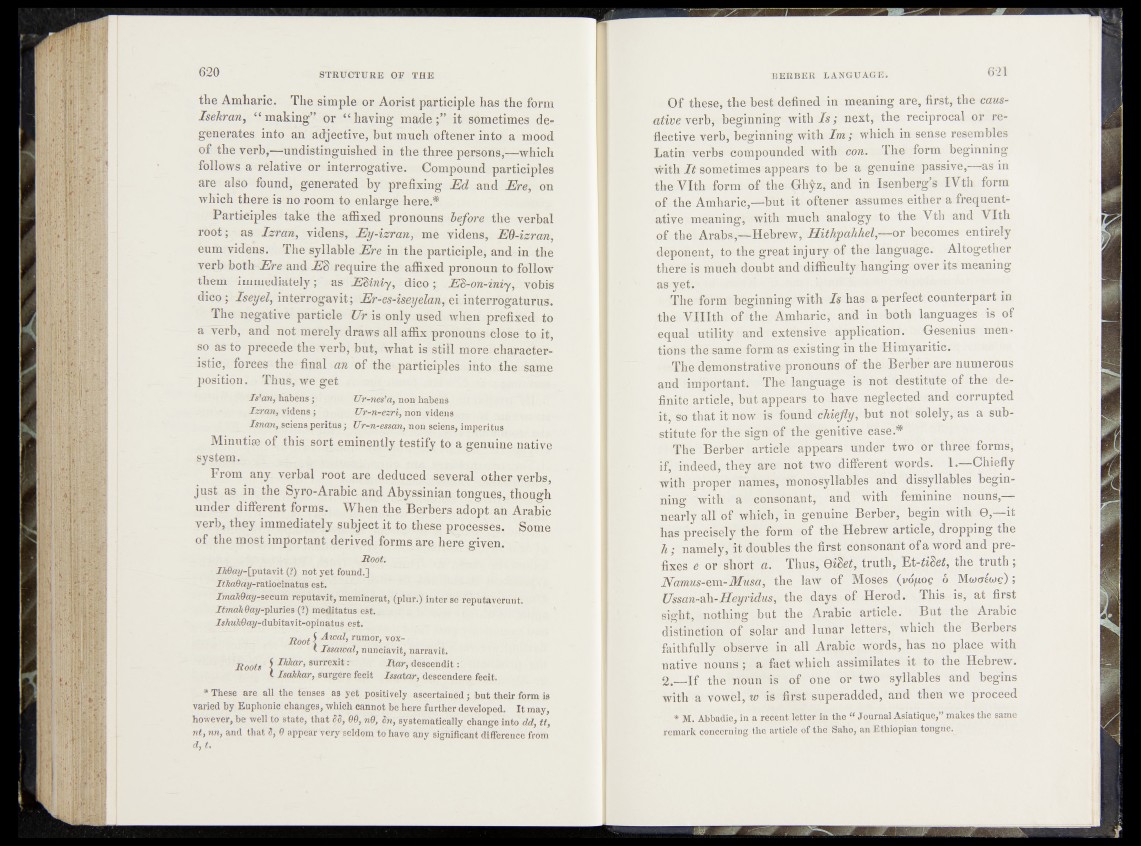
the Amharic. The simple or Aorist participle has the form
Isekran, “ making” or “ having made;” it sometimes degenerates
into an adjective, but much oftener into a mood
of the verb*—undistinguished in the three persons*—which
follows a relative or interrogative. Compound participles
are also found, generated by prefixing Ed and Ere, on
which there is no room to enlarge here.*
Participles take the affixed pronouns before the verbal
root; as Izran, videns, Ey-izran, me videos, EO-izran,
eum videns. The syllable Ere in the participle, and in the
verb both Ere and Ed require the affixed pronoun to follow
them immediately; as Ediniy, dico; Ed-on-iniy, vobis
dico; Iseyel, interrogavit; Er-es-iseyelan, ei. interrogaturus.
The negative particle Ur is only used when prefixed' to
a verb, and not merely draws all affix pronouns close to it,
so as to precede the verb, but, what is still mom characteristic,
forces the final a» of the participles into .the same
position. Thus, we get
Ts’an, habens; Ur-nes’a, non habens
Izran, videns; Uir-n-ezri, non videns -
/snan, sciens peritus; Ur-n-essan, non sciens* imp.eritus
Minutiae of this sort eminently testify to a genuine native
system.
From any verbal root are deduced several other verbs,
just as in the Syro-Arabic and Abyssinian tongues, though
under different forms. When the Berbers adopt an Arabic
verb, they immediately subject it to these processes. Some
of the most important derived forms are here given.
Moot.
_ZA0cM/-[putavit (?) not yet found.]
jRfoi06K/-ratioeinatus est.
ImaWay-secum. reputavit, meminerat, (plur.) inter se reputaveruut.
Itmdk 0at/-plurie3 (?) meditatus est.
J«AM&0a^-dubitavit-opinatus est.
Boot \ ■A-wal’ rumor> voxt
Issawal, nunciavit, narravit.
Boots \ IAkar> surrexit: liar, descendit:
l Isdkkar, surgere fecit Issatar, descendere fecit.
* These are all the tenses as yet positively ascertained; but their form is
varied by Euphonic changes, which cannot be here further developed. It may,
however, be well to state, that Sd, 00, n0, tin, systematically change into dd, tt,
nt, nn, and that 5, 0 appear very seldom to have any significant difference from
d , t .
Of these, the best defined in meaning are, first, the causative
verb* beginning with Is| next, the reciprocal or reflective
verb* beginning with Im ; which in sense resembles
Latin verbs compounded with con. The form beginning
with It sometimes appears to be a genuine passive,—as in
the VIth form of the Oh^z, and in Isenberg?s IVth form
of the Amharic,—^but it oftener assumes either a frequent-
ative&meaning, with much analogy ; to the Vth and With
of the Arabs,-—Hebrew, Hitkpahhd,—-or becomes entirely
deponent, to the great injury of the language. Altogether
there is touch doubt and difficulty hanging over its meaning
as yet.
The form beginning with Is has a perfect counterpart in
the VHIth of the Amharic, and-ia both languages is of
equal utility | and extensive application , ©esenius mentions
the same form as existing in the Himyaritic.
The demonstrative pronouns of the. Berber are numerous
and important. The language is hot destitute of the definite
article*, hut appears to have neglected and corrupted
it, so that it now is found chiefly ± but not solely, as a substitute
for the sign, of the' genitive case*
The Berber article appears under two or three forms,
if, indeed, they are not two different words«.' 1.—Chiefly
with proper names, monosyllables and dissyllables beginning
“with a consonant, and with feminine ~ nouns,
nearly all of whi ch,genuine Berber, begin with 0/Vit
has precisely the form of the Hebrew article, dropping the
h • namely, it doubles the first consonant of a word and prefixes
e or short a. Thus, Qidêt, truth, Et-tiSe£,the truth ;
Namus-om-Musa, the law of Mosês, (vófxog A Mwirewc);
Ussan-üh-Heyridus, the days of Herod. This is, at first
sight, nothing but the Arabic articiy! But the Arabic
distinction of ^olar and lunar letters, which the Berbers
faithfully observe in all Arabic words, has no place with
native nourish a fact which assimilates .it to the Hebrew.
2.—If the noun is of one or two syllables and begins
with a vowel, w is first superadded, and then we proceed
* M. Abbadie, in a recent letter in the “ Journal Asiatique,” makes the same
remark concerning the article of the Saho, an Ethiopian tongne.